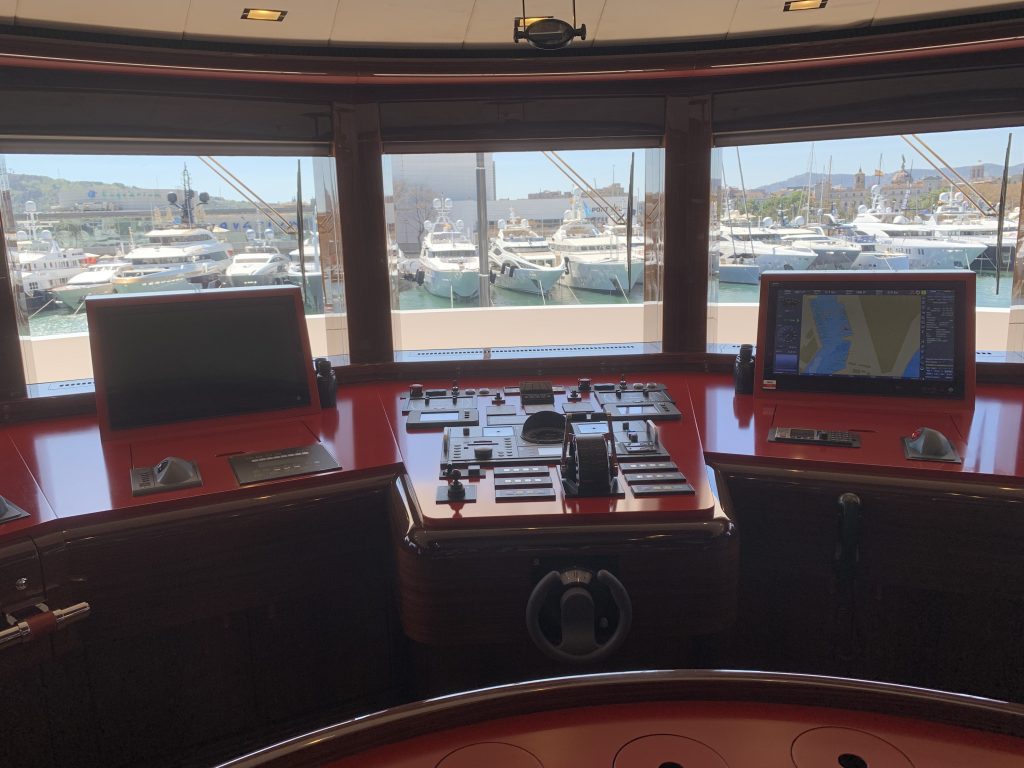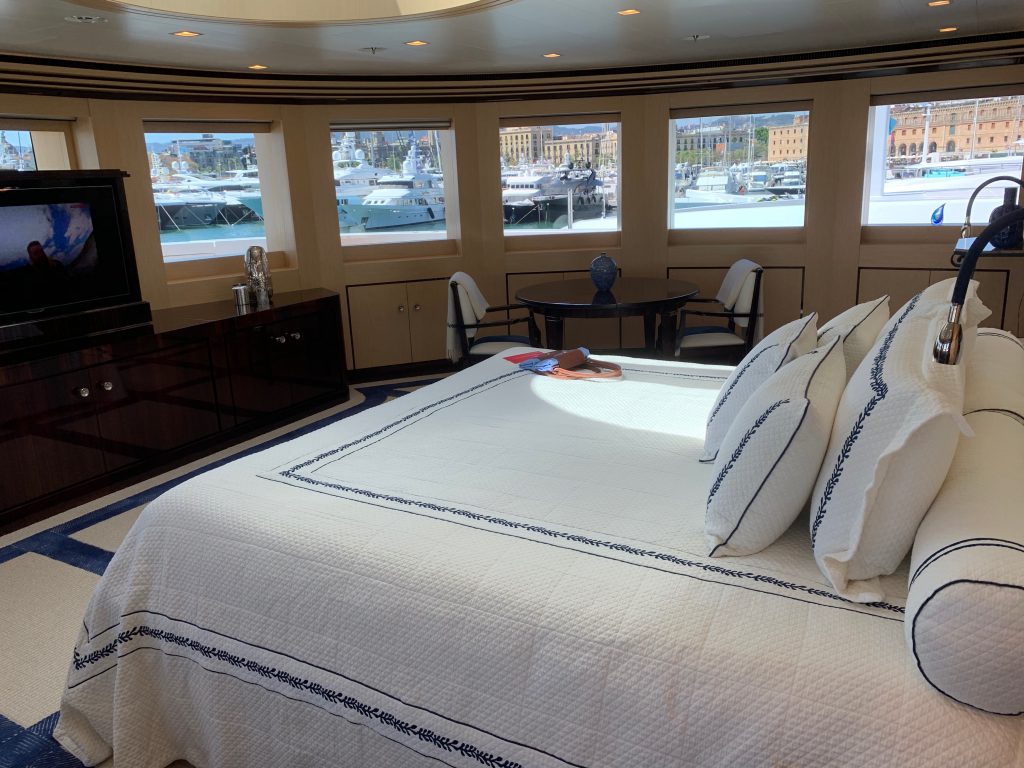There are many differences between shore life and yachting life. You might have friends or family who have worked in yachting. Their experience will not be your experience. You really do need to ask yourself if you are equipped for a life at sea, working to the highest possible level of service. It is elite, and it really isn’t for everyone.
Yachting is not a 9-5 Monday to Friday job
Yachting is 24/7 and you can be constantly on the move and away from friends and family. It is essential that this is as understood as much as possible. There are many junior crew who get dazzled by merely a job offer, or money, or programme etc, when the really important details are who the captain is, who the head of department is, nationality of fellow crew onboard and how long those crew have been together – those details tell a lot about the back story of the boat/job.
Crew are everything – you eat/live/work/play together. There have been many junior crew who chose a job out of either desperation or for misguided reasons and ended up having a terrible first experience and leaving the industry. You should expect the first job to be tough, because everything you think you know will turn out to be wrong in many ways.
You have much to learn and nothing you learn from a classroom will prepare you for an exhaustion you have never felt – where your feet hurt before you get out of bed and your pillow scars take 7 hours to wear off – and all the time, getting up every day and putting on a smile and doing the job 110%. It is relentless. You won’t know what day it is or where you are most of the time – and honestly it is irrelevant. If you are coming into yachting to ‘travel’ you are likely to be a little disappointed – most of your view will be from a porthole – you are not a guest.
Main superyacht hubs
Main hubs for yachting in the Mediterranean are Antibes, Barcelona and Palma de Mallorca. They are all good, but Antibes has always been considered preferable for the access to Italy and Spain on the mainland. You can travel easily by train along the coast from port to port (there is a cheap weekly ticket you can buy at a station)

Basic qualifications
All crew, regardless of position, will require minimum qualifications to work at sea, STCW/PSA or PDSD an ENG 1 (or seafarers medical). Interior positions additionally require food hygiene qualifications. Deck candidates must have a powerboat level II – more is always good.
Writing a yachting CV
Once you have committed to finding a position in yachting, you have your qualifications, your next step is to create a strong CV. Remember this is the first thing an employer will see about you, it is vital to pay time and attention to this. Visit this page for information on writing a yachting CV. I am particularly fussy about a CV, it is an important document.
Registering with agents
There are many and you will need to register with the ones you feel are right for you. Many will ask for a different CV, that is their prerogative. You will work out who you like working with and should keep to those – or it will become overwhelming. Remember who you have registered with – a note pad can be handy.
Steward/stewardess
With a background in hospitality you will certainly be at a strong advantage when looking for a first position. Yachting is beyond 5*, but working in hotels, ski chalets and restaurants will all give you a good idea about service and housekeeping. Those are all transferable skills that you can build on. Daywork and temporary work is a must – it is a measure of your interest and motivation. Cannes film festival and Monaco Grand Prix always need extra service staff for the parties that yachts will have during these events. Temporary jobs at events are a great way to learn how it works with guests onboard, a great way to learn the job. It is also your forum to show what you are capable of – work ethic, dynamic, how fast you can learn, how you work under pressure. I have placed crew in permanent positions based on references from temp/daywork. As an industry, we aren’t easily impressed, so if a chief stew tells me that she would employ you if she had a position open, I know that you will make it, I know that you are someone I can help.

Deckhands
The number of times I hear junior deckhand candidates tell me that the position they are seeking is ‘deckhand, because I don’t know anything else’ is countless. This is the one junior position that you really do need some form of maritime background for – ideally. You won’t learn how to tie a knot in any other walk of life (teach yourself? There are a couple of good apps out there and of course, YouTube), so if you have a sailing background, have worked in the scuba diving industry or watersports – even if your experience this far has been recreational – you have a head start. As a deckhand, you are not chamoising looking cute all day – though cleaning is a huge part of the job. You are driving owners and guests safely (without getting them wet) in very large often very technical tenders. You are operating cranes/davits, winches, heli-ops etc. Nowhere else will you need to know how to put an inflatable water-park up, or attach a slide. The more relevant experience you have the better your chances because the more knowledge you are bringing with you. Saying that, it isn’t impossible to find work as a junior with no relevant skillset. Many of my clients comment that they would take a ‘newbie’ with the right attitude over someone with extra qualifications. Where there is a will to learn and succeed, a way will be found. You do very much get out of yachting what you put in.
Dockwalking
Dockwalking is literally walking on the docks all day, meeting yacht crew and introducing yourself as a potential crew member/dayworker. Always be clean shaven and smart (boys) and polite. The girls are actually better to avoid the cliché polo shirts/shorts – heads of departments are the ones who really aren’t impressed, it isn’t just me. All it does is tell the crew on the aft-deck who see you first, that you are ‘new’ – ie you have no yachting experience. They will reach the point where they stop taking time to talk to you, they will be too busy and too tired. Wearing a dress/skirt/colour (anything smart/interview ready) is more likely to give the impression that you are not new – because not one girl who has a seasons yachting experience would dock walk in a polo/shorts – ask them. Flipflops and board shorts or bikinis impress no one here. If you ‘can’t be bothered’ dockwalking you should not be here. Go home, you don’t want it enough.
Daywork
Yachts often need extra help if they are short-handed, or tired. They will take ‘dayworkers’ who will literally come onboard for the day (or more) – usually 8am until 6pm – and are paid by the day or the hour if a long day. You are there to work, not to play on your phone – and yes, I do get told the ones who spend more time organising their social life than doing the job. Nor should you take video or photos – you wouldn’t find it acceptable to have strangers coming into your home and doing that – be respectful. Be aware, daywork is a grey area – be discreet.

You can learn a huge amount doing daywork/temporary work
When you have daywork experience, make sure you add the experience to the CV at the top of your work history. Mark what products you have used – we have also use technical cleaning products onboard – deck – Rain-X, Semco, Awl-wash, Flitz. For the interior, the same applies – laundry is often a skill missing – and is a third of the job of a stew, so if you get that as an option, do it. Laundry machines, stain removal, learning how to use the roller-iron/steam iron etc etc.
There is nothing that cannot be taught, if you have the right attitude and mindset
This industry is not for the feint hearted, the lazy or the entitled. You are here in a very adult industry and much will be expected of you, regardless of your age. You are not entitled to a job because you have paid for courses. You cannot make someone hard working, you cannot make someone care that a job is well done – you are either that person or you aren’t. Attitude is very much more than half the job and all yachts are seeking crew who are switched on, interested and motivated – not those who are looking to fill a gap year. Daywork is a great forum for you to show that you are the person that your CV says you are (although ‘hardworking’ and ‘reliable’ are rather a cliché). We are an industry that notices everything about you – good and bad. Working hard for one yacht as a dayworker can lead to more daywork on that same yacht or another yacht – or even a job. Treat it like ‘just daywork’ and you aren’t likely to get very far – nor do you deserve to.
Once you have been lucky enough to earn yourself a first position, it doesn’t end there. Your learning curve is just beginning. Finding that first job is hard enough, keeping it is harder. Do not rest on your laurels.

